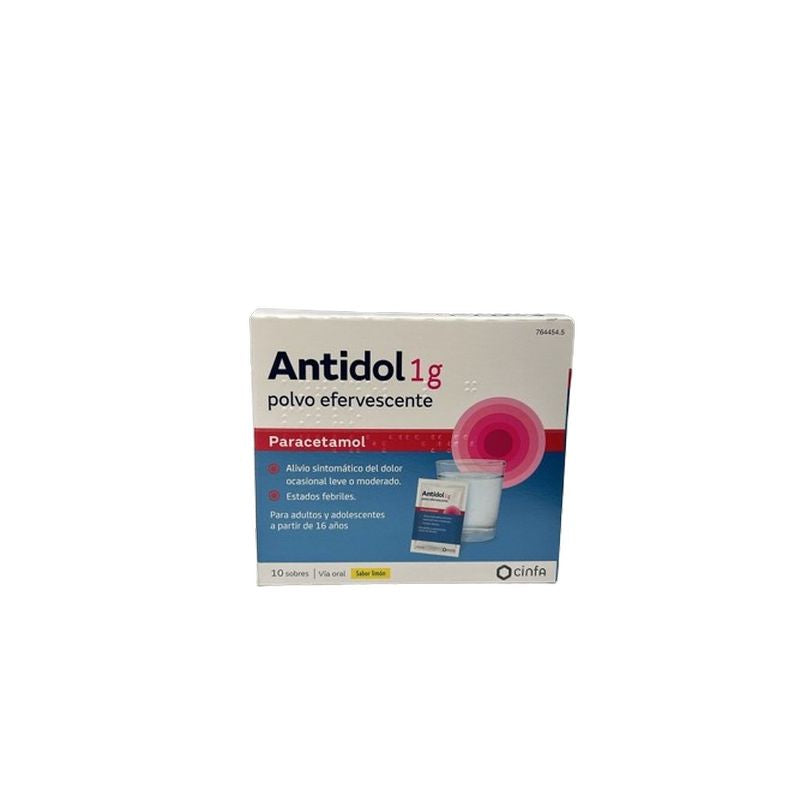Antidol is a non-prescription medicine used for the symptomatic relief of occasional mild to moderate pain, such as headache, dental pain, muscle pain (contractures), back pain (lumbago) and fever.
10 sachets effervescentpowder .

This medicine is used for the symptomatic relief of occasional mild to moderate pain, such as headaches, dental pain, muscle pain (contractures) or back pain (lumbago), as well as feverishness. It is ideal for those looking for an effective analgesic that is also easy to use.
Adults and adolescents from 16 years of age (or body weight over 50 kg).
This medicine is taken orally by dissolving the contents of the sachet in a glass of water. To know how to use it correctly, it is important to follow the instructions on the package leaflet.
Adults and adolescents over 16 years of age (and weighing more than 50 kg):
Do not exceed 1 gram of paracetamol per dose. Do not take more than 3 g of paracetamol in 24 hours spread over 3 doses. The use of this medicine is subject to the onset of symptoms, pain or fever. As these disappear, treatment should be discontinued.
High daily doses of paracetamol should be avoided for prolonged periods of time as this increases the risk of adverse effects such as liver damage.
If pain persists for more than 5 days, fever for more than 3 days, or if pain or fever worsen or other symptoms appear, a doctor should be consulted and the clinical situation re-evaluated.
Like all medicines, this medicine may cause side effects, although not everybody gets them.
Possible side effects of paracetamol are:
Serious skin reactions have been reported very rarely. Paracetamol can damage the liver when taken in high doses or in prolonged treatment.
Consult your doctor or pharmacist before you start taking Antidol.
Paracetamol should be used with special caution in the following situations:
Paracetamol can cause severe skin reactions such as acute generalised exanthematous pustulosis (AGEP), Stevens-Johnson syndrome (SJS), and Toxic Epidermal Necrolysis (TEN), which can be fatal. Patients should be informed about the signs of serious skin reactions, and the use of the medicine should be discontinued at the first sign of skin rash or any other sign of hypersensitivity.
The total dose of paracetamol should not exceed 3 g per day. Concomitant use of this medicine with other medicines containing paracetamol, e.g. cold and flu medicines, should be avoided, as high doses may cause liver damage. Do not use more than one medicine containing paracetamol without consulting your doctor. If an overdose occurs, seek medical attention immediately.
If you suffer from kidney problems, due to its 1 g paracetamol content you cannot take this medicine. People suffering from liver, heart or lung diseases and patients with anaemia should consult a doctor before taking this medicine.
Administration of higher than recommended doses of paracetamol carries a risk of very serious liver damage.
Medicines containing paracetamol should not be taken for more than a few days or in high doses unless directed by your doctor. If pain persists for more than 5 days, fever for more than 3 days, or if pain or fever worsen or other symptoms appear, you should stop treatment and consult your doctor.
Prolonged use of painkillers or inappropriate use of high doses may cause headache, which should not be treated with higher doses of the medicine.
They should take the amount of medicine prescribed by their doctor with a minimum interval of 8 hours between each dose. They should not take more than 2 grams of paracetamol in 24 hours, spread over several doses. Chronic alcoholics should be careful not to take more than 2 g of paracetamol in 24 hours.
This medicine does not conform to the dosage recommendation for patients with severe or moderate disease. Due to the paracetamol content per sachet (1 g), this medicinal product should not be used in patients under 16 years of age.
The active substance is paracetamol. Each sachet contains 1 g of paracetamol.
The other ingredients are: sodium hydrogencarbonate, anhydrous citric acid, mannitol (E-421), sodium benzoate (E-211), anhydrous sodium carbonate, povidone, saccharin sodium and lemon flavouring.
In elderly patients, it is advisable to consult your doctor in advance for advice on how often to take the product and if you need to reduce the dose.
The price of non-prescription medicines is set by law. However, at Farmaciasdirect you can buy Antidol 1 G, 10 sachets effervescent powder with a discount of up to 10%, which is the legal maximum allowed. Buying this product at Farmaciasdirect has the advantage that you are buying it from a pharmacy approved by the Spanish Medicines Agency for the sale and distribution of this product.
